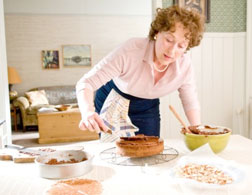Julie & Julia
Meryl Streep is amazingly good as Julia Child.
After you've seen Julie & Julia, come back and listen to our Spoiler Special discussion of all the tasty tidbits:
You can also click hereto download the MP3 file, or you'll find this and dozens of other Spoiler Specials in our iTunes podcast feed here.
Watching Julie & Julia (Columbia Pictures), I could hear in my mind the faint buzz of what the movie's detractors would probably say. There's not nearly enough conflict in this upbeat story of two happily married women overcoming minor obstacles to find themselves as cooks and writers. The screenplay is meandering, lacking in dramatic structure. The modern-day scenes, in which Amy Adams plays the Queens-based food blogger Julie Powell, lack the zing of the wonderful period segments with Meryl Streep as Julia Child in mid-20th-century Paris. The score by Alexandre Desplat can get overly expressive, earnestly underlining the pathos or humor of moments that were doing just fine on their own. But I didn't let this imaginary nitpicking interfere with my pleasure. When you sit down to a meal, do you want it to be filled with "conflict" and "structure"? Do you whine if the witty little amuse-bouche (Adams) doesn't quite match the pièce de résistance (Streep) in complexity and richness? In short, do you complain that your dinner was too delicious? If so, it's not hard to locate a McDonald's and a theater showing G.I. Joe. But if you don't mind the occasional dip in a bain-marie of pure joy, give yourself over to Julie & Julia.
The opening titles announce that the movie will be based on two true stories: Child's years in Paris with her diplomat husband, Paul (Stanley Tucci), as chronicled in her autobiography My Life in France, and Powell's (Amy Adams) memoir of her year spent cooking and blogging her way through Child's seminal cookbook, Mastering the Art of French Cooking, with the support of her own well-fed but sexually starved spouse, Eric (Chris Messina). Nora Ephron, who wrote and directed the movie, loves this kind of parallel cross-cutting structure; the leads in Sleepless in Seattle never met until the last scene, and Julie's and Julia's lives overlap even less. Julie works at a phone bank at the Lower Manhattan Development Corporation, overlooking the 9/11 ruins as she dispenses useless advice to frustrated survivors. ("Do you have any power?" barks one caller. "I want to speak to someone with power.") Julie, a would-be writer with an unfinished novel, is bored and depressed until Eric suggests she turn her passion for food into an online writing project. In the year that follows, Julie looks deep within herself—a little too deep for Eric, who starts to resent her all-consuming obsession with poulet rôti à la Normande, raspberry Bavarian cream, and her blog's steadily growing yet mysteriously unquantifiable readership. (I know it's supposed to be 2002, but haven't these people ever heard of hit counters?)
It's when Ephron cuts to Paris that the poulet rôti hits the fan. Streep's incarnation of Julia Child towers, literally and figuratively, over the movie. She plays the beefy, 6-foot-2-inch Child with lusty comic verve, yet her performance isn't broad in the least. Every word that emerges in that familiar octave-swooping voice is both hilariously funny and deeply felt. From the movie's first scene, in which Streep and Tucci wordlessly bond over the deliciousness of a sole meunière, we understand this woman completely: She's a sensualist and an adventurer, deeply in love with her husband and far too ambitious to settle for the life of a diplomat's wife. Tucci's understated performance as the wryly bemused partner of this human tornado is a treasure, too. In two brief scenes, it's suggested that Julia and Paul, now in middle age, have missed out on their chance to conceive a child. When Julia learns that her sister (a sidesplittingly funny Jane Lynch) is pregnant, Streep makes all Julia's reactions—resentment, joy, grief, resignation—visible in quick succession.
Because the movie turns on plot points no bigger than "Will my book be published?" and "Is the boeuf bourguignon overdone?," Julie & Julia may be dismissed as insubstantial fluff, a ditzy "women's picture." And it's true that Nora Ephron doesn't rank among our nation's deepest thinkers, though she shows a surer directorial hand here than she has before. Still, the relationship at the heart of this movie—between a female mentor and pupil who never meet but who share a common passion and a drive to reinvent themselves—is one you don't often see depicted in the movies. Julie & Julia makes deboning a duck a feminist act and cooking a great meal a creative triumph. The stakes may not be as high as the kill-or-be-killed suspense of a summer action movie, but the sauces are way tastier.
Slate V: The Many Voices of Meryl Streep
